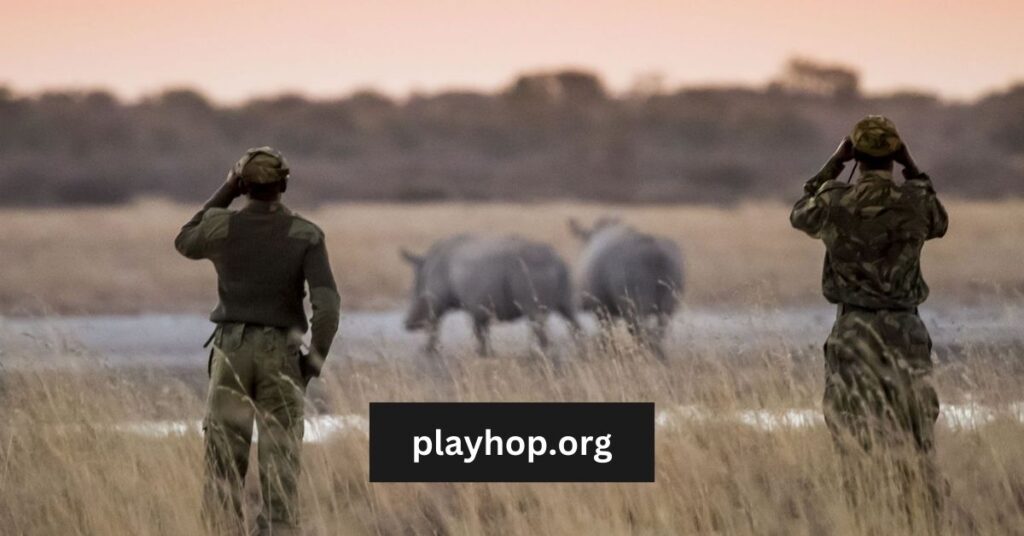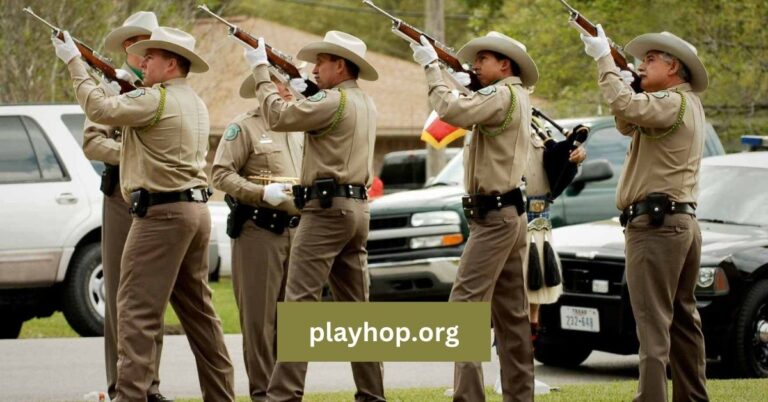Becoming a game warden is a rewarding career path for those passionate about wildlife conservation and environmental protection. Game wardens play a vital role in enforcing laws that safeguard natural resources, ensuring the health and sustainability of wildlife populations. They monitor habitats, investigate violations, and educate the public about responsible practices. This profession not only requires a deep love for the outdoors but also a commitment to preserving ecosystems for future generations. With increasing threats to wildlife from poaching and habitat loss, the need for skilled game wardens has never been greater. If you have a desire to protect nature and enjoy working in various outdoor environments, a career as a game warden may be the perfect fit. This guide will provide you with essential steps to embark on this fulfilling journey and make a meaningful impact in the field of wildlife management.
Who is a Game Warden
A Game Warden is a law enforcement officer who specializes in protecting wildlife and natural resources. Their primary role is to enforce state, federal, and local laws that regulate hunting, fishing, and wildlife conservation. Game wardens patrol wilderness areas, forests, lakes, and coastal regions to ensure that outdoor activities like hunting and fishing are conducted legally and responsibly.
Their duties include investigating wildlife-related crimes, catching poachers, inspecting hunting and fishing licenses, and educating the public about conservation laws. They often collaborate with other law enforcement agencies and conservation organizations to monitor ecosystems, protect endangered species, and maintain the balance of natural habitats.
Game wardens also play a key role in promoting public safety. This includes responding to emergencies like natural disasters or rescuing people in distress in remote areas. They are trained in search and rescue operations, firearm use, and often handle situations involving dangerous wildlife.
The role of a game warden is crucial for wildlife conservation and public safety, making them guardians of both the environment and the community.
Educational Requirements
To become a game warden, education plays a crucial role in preparing for the responsibilities of the job. At a minimum, you’ll need a high school diploma or equivalent, but most agencies prefer or require candidates to have a college degree.
Obtain a Relevant Bachelor’s Degree
- Pursuing a bachelor’s degree enhances your knowledge of wildlife, law enforcement, and environmental conservation
- Commonly preferred degrees include Criminal Justice, Wildlife Management, Environmental Science, Biology, or Forestry
- These programs help you understand wildlife behavior, ecosystems, law enforcement techniques, and natural resource management
Specialized Courses and Skills
- While earning your degree, focus on courses that provide a strong foundation in law enforcement principles, environmental policies, wildlife biology, and ecology
- Take elective courses in areas like public speaking, communication, and conflict resolution since these skills will help you interact with the public and enforce laws effectively
Importance of Law Enforcement Knowledge

- Understanding the basics of law enforcement is essential because game wardens are law enforcement officers
- Many universities offer criminal justice programs with a specialization in wildlife law enforcement, providing a balanced mix of legal knowledge and wildlife science
Consider Graduate Studies (Optional)
- Though not mandatory, pursuing a master’s degree can make you more competitive, especially if you aim for higher positions or specialized roles
- A graduate degree in Environmental Science, Wildlife Biology, or Natural Resource Management can open doors to more opportunities within federal agencies or management roles
Online Learning and Certifications
- Some institutions offer online courses or certifications in wildlife management or conservation, which can be valuable for those who need flexible study options
- Online courses are especially useful if you’re already working or want to gain additional knowledge in specific areas like environmental law or habitat conservation
By meeting these educational requirements, you’ll have the foundation needed to succeed in a game warden career and increase your chances of passing the rigorous selection process.
Physical and Mental Fitness Requirements
Becoming a game warden requires excellent physical and mental fitness due to the demanding nature of the job. Game wardens often work in outdoor environments, navigating rough terrain, forests, mountains, and bodies of water. To successfully perform these duties, candidates must meet specific fitness criteria.
Physical Fitness
Game wardens must maintain a high level of physical fitness to perform the following tasks effectively:
- Endurance: Game wardens may spend long hours on foot, patrolling remote areas. Hiking across difficult terrain, often while carrying equipment, is common.
- Strength: The job involves handling heavy gear, restraining suspects, and sometimes performing rescue operations. Physical strength is essential for these situations.
- Agility: Quick reflexes are necessary for reacting to unexpected situations, such as pursuing suspects or dealing with dangerous wildlife.
- Swimming Proficiency: Game wardens often patrol lakes, rivers, and coastal areas, making swimming a crucial skill for water rescues or investigations.
- Shooting Proficiency: Candidates need strong hand-eye coordination and firearm training to protect themselves and others when necessary.
To meet these demands, game wardens typically undergo physical fitness tests during the application process, which may include running, swimming, and strength assessments. Regular exercise and fitness maintenance are crucial for staying in shape throughout their career.
Mental Fitness
The mental demands of being a game warden are just as significant as the physical requirements. The job often involves working in remote areas, facing challenging situations, and interacting with the public, which requires strong mental resilience:
- Emotional Stability: Game wardens must handle stressful and high-pressure situations, such as dealing with wildlife violations, law enforcement actions, or emergencies, without losing composure.
- Problem-Solving: Game wardens frequently make decisions in unpredictable circumstances, like handling conflicts with poachers or emergencies in the wilderness. Being quick-thinking and resourceful is essential.
- Communication Skills: Game wardens need to communicate clearly with both the public and law enforcement teams, especially when diffusing tense situations or explaining regulations.
- Patience and Perseverance: Many duties involve long hours of surveillance or patrolling, often in isolation. Mental perseverance is necessary to stay focused and alert during these extended periods.
Overall, game wardens must train both their body and mind to meet the unique challenges of the job. Maintaining a balanced physical and mental fitness routine will ensure their readiness to handle any situation they encounter in the wild.
Specialized Training and Certifications
Becoming a game warden requires more than just formal education. Specialized training and certifications play a crucial role in preparing candidates for the unique challenges of the job. Here’s an in-depth look at what you need to know:
Law Enforcement Academy Training
- Most states require aspiring game wardens to attend a law enforcement academy
- The training includes lessons in criminal law, wildlife regulations, search and rescue techniques, and handling evidence
- Trainees learn firearm proficiency, self-defense, and emergency response, which are essential skills for law enforcement duties
Game Warden Training Programs

- After law enforcement training, new game wardens typically undergo additional training focused on wildlife law enforcement
- These programs teach how to handle wildlife-related incidents, identify illegal hunting practices, and understand conservation laws
- Practical skills such as tracking poachers, using GPS, handling boats, and conducting search and rescue operations are emphasized
Firearm and Defensive Tactics Certification
- As game wardens often encounter dangerous situations, firearm proficiency is mandatory
- You must pass firearm training and defensive tactics courses to handle threats safely
- Training covers the use of sidearms, rifles, and sometimes non-lethal weapons
First Aid and CPR Certification
- Game wardens often work in remote areas where medical help isn’t immediately available
- Certification in First Aid and CPR ensures you can provide emergency medical assistance when needed
- Some agencies may also require advanced wilderness first aid training
Wildlife Identification and Management Training
- This specialized training helps you identify different species, understand their behaviors, and manage wildlife populations
- It includes learning about habitat conservation, wildlife diseases, and the impact of human activity on
Search and Rescue Training
- Search and rescue training is essential for game wardens who may need to locate lost or injured hikers, hunters, or boaters
- This training involves navigation skills, water rescue techniques, and the use of specialized equipment
Optional Advanced Certifications
- Additional certifications can boost your career and open doors to specialized roles
- Examples include certifications in marine patrol, SCUBA diving for underwater investigations, or handling K-9 units for search and detection
- Some states offer advanced wildlife law enforcement training for game wardens who want to expand their expertise
Continuous Training
- Even after becoming a game warden, ongoing training is necessary to stay updated on new laws, technologies, and wildlife management techniques
- This ensures you remain effective in your role and can handle evolving challenges in wildlife conservation
Job Application Process
The job application process for becoming a game warden involves several steps and can be quite competitive. Here’s a breakdown of what to expect:
Submitting an Application
- Start by finding job openings through state wildlife agencies, federal agencies like the U.S. Fish and Wildlife Service, or conservation organizations
- Ensure your application is complete, including any required documents such as your resume, cover letter, academic transcripts, and proof of any certifications
- Tailor your resume to highlight relevant skills like law enforcement, outdoor experience, or wildlife management
Background Check and Screening
- Expect a thorough background check, including criminal history, credit reports, and employment history
- Be prepared to answer questions about your character, behavior, and past activities, as game wardens must demonstrate integrity and trustworthiness
Physical Fitness Test
- Many agencies require candidates to pass a physical fitness test that includes activities like running, swimming, lifting, and obstacle courses
- This test assesses your ability to handle the physical demands of the job, such as hiking through rough terrain or carrying equipment
Written Exam
- The written exam typically evaluates your knowledge of wildlife laws, environmental science, observation skills, reading comprehension, and problem-solving abilities
- Study beforehand by reviewing wildlife regulations, law enforcement principles, and basic biology concepts
Oral Interview
- If you pass the previous stages, you will be invited for an oral interview, usually conducted by a panel of officers or wildlife professionals
- They may ask about your experience, motivation, knowledge of wildlife laws, and how you would handle different scenarios in the field
Psychological Evaluation
- This assessment determines if you have the mental and emotional stability required for a job that can be stressful and unpredictable
- You may be given questionnaires or participate in interviews with a psychologist
Medical Examination
- A medical examination ensures you are in good health and capable of performing the physical tasks required of a game warden
- Tests might include vision, hearing, and general physical health evaluations
Training Academy
- If you pass all these stages, you will be accepted into a training academy where you’ll receive intensive training in law enforcement, wildlife laws, firearm handling, first aid, and survival skills
- This training can last anywhere from a few weeks to several months, depending on the agency
By successfully navigating this process, you’ll be well on your way to starting your career as a game warden. Each step is designed to ensure you have the skills, knowledge, and character to protect wildlife and enforce conservation laws.
Challenges and Rewards of Being a Game Warden
Challenges
- Harsh Working Conditions: Game wardens often work in remote areas, facing extreme weather conditions and rugged terrain. This can lead to physical strain and safety risks during patrols.
- Dangerous Situations: The job may involve encounters with poachers, wildlife, or hazardous environments. Game wardens must be prepared to handle potentially violent confrontations.
- Emotional Strain: Dealing with illegal activities, injured wildlife, or poaching can take an emotional toll. Game wardens often witness the consequences of human impact on the environment.
- Public Interaction: Not all public interactions are positive. Game wardens may face hostility or resistance from individuals who violate wildlife laws. Strong communication skills are essential.
- Long Hours: The job often requires irregular hours, including weekends and holidays. This can impact personal life and work-life balance.
Rewards
- Contributing to Conservation: Game wardens play a crucial role in protecting wildlife and natural resources. This work fosters a sense of purpose and connection to nature.
- Varied Work Environment: Every day offers new challenges and experiences in different outdoor settings. This variety keeps the job exciting and engaging.
- Community Impact: Game wardens educate the public about wildlife conservation and environmental stewardship, promoting positive change in communities.
- Job Security and Benefits: Many positions offer good job security, benefits, and opportunities for retirement plans. Government positions often come with stable employment.
- Career Advancement: With experience and additional training, game wardens can advance into specialized roles or management positions, expanding their impact on conservation efforts.
Overall, while the challenges are significant, the rewards of protecting wildlife and contributing to conservation efforts make the role of a game warden deeply fulfilling.
Tips for Success as a Game Warden
Stay Informed About Wildlife Laws
- Regularly update your knowledge of local and national wildlife regulations
- Attend workshops and training sessions to understand changes in laws
Develop Strong Communication Skills
- Practice clear and effective communication with the public
- Build rapport with community members to foster trust and cooperation
Enhance Physical Fitness

- Maintain a regular fitness routine to handle the physical demands of the job
- Engage in activities like hiking and swimming to improve endurance
Cultivate Observation Skills
- Sharpen your ability to notice details in the environment
- Use these skills to detect illegal activities or signs of wildlife distress
Network with Other Professionals
- Build relationships with fellow wardens, conservation officers, and wildlife biologists
- Join professional organizations for networking and career development
Embrace Technology
- Familiarize yourself with tools and software used in wildlife management
- Utilize GPS, drones, and data management systems for effective patrolling
Be Adaptable and Resilient
- Prepare for unpredictable situations and changes in the environment
- Develop problem-solving skills to navigate challenges effectively
Commit to Lifelong Learning
- Pursue ongoing education in wildlife management, law enforcement, and environmental science
- Stay current with best practices and new technologies in the field
Practice Ethical Decision-Making
- Uphold high ethical standards in your work
- Make decisions that reflect a commitment to conservation and public trust
Foster Passion for the Environment
- Share your enthusiasm for wildlife and conservation with others
- Inspire others to appreciate and protect natural resources through education and outreach efforts
Conclusion
In conclusion, becoming a successful game warden requires a combination of education, physical fitness, and strong communication skills. By staying informed about wildlife laws and cultivating observation abilities, you can effectively protect natural resources and engage with the community. Building a network of professionals enhances your knowledge and support. With dedication and passion for conservation, you can make a meaningful impact in preserving wildlife for future generations.
FAQ’s
What qualifications do I need to become a game warden?
A high school diploma is essential, but a degree in wildlife management, conservation, or law enforcement is often preferred.
Are there specific physical requirements?
Yes, candidates must meet certain physical fitness standards, as the job involves outdoor activities and potentially strenuous tasks.
What skills are important for a game warden?
Strong communication, problem-solving, and observational skills are crucial, along with knowledge of wildlife laws and conservation practices.
Do I need prior law enforcement experience?
While not always required, previous experience in law enforcement or a related field can be beneficial.
How can I gain experience in wildlife conservation?
Volunteer with local conservation organizations, participate in internships, or work in related fields to gain valuable experience.
Is there a certification process?
Yes, many states require game wardens to complete training programs and obtain certification through wildlife agencies.
What are the typical duties of a game warden?
Duties include enforcing wildlife laws, conducting investigations, educating the public, and monitoring wildlife populations.
Can I work as a game warden part-time?
Most game warden positions are full-time, but some agencies may offer seasonal or part-time roles.
What is the salary range for game wardens?
Salaries vary by location and experience, typically ranging from $40,000 to $70,000 annually.
How can I stay updated on wildlife laws and regulations?
Join professional organizations, attend workshops, and follow relevant government agencies to stay informed on changes in wildlife laws.

